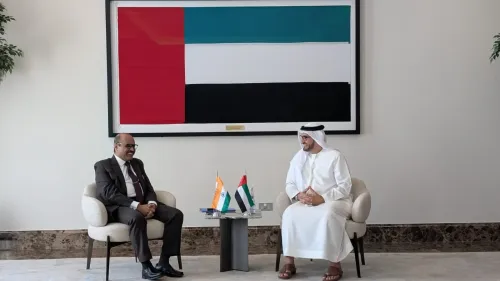How Did Israel Respond to the 26/11 Attack on Humanity?

Synopsis
Key Takeaways
- Israel stands with India in the fight against terrorism.
- The 26/11 attacks were an attack on humanity.
- Shared experiences form the foundation of India-Israel relations.
- Honoring the victims and first responders is crucial.
- The battle against terror requires international cooperation.
New Delhi, Nov 26 (NationPress) The Israeli Ambassador to India, Reuven Azar, on Wednesday honored the memory of the victims of the 26/11 Mumbai terror attacks, describing it as an attack on humanity. He reaffirmed Israel's determination to collaborate with India in combating terrorism in its various manifestations.
In a video message shared on X, Azar emphasized that the assault affected individuals from every community, nationality, and faith. He remarked that Israel deeply understands the anguish of losing innocent lives to terrorism and is committed to fighting back with courage, clarity, and determination.
"As India commemorates the anniversary of the tragic 26/11 Mumbai terror attacks, I, along with the people of Israel, stand in solidarity with you, the Indian populace, just as we did on that grim day and every year after. The events of 26/11 were not merely a strike against Mumbai; they were an attack on humanity," Azar remarked.
"The attack was aimed at individuals from every community, every nationality, and every faith, including both Indians and Israelis. Sadly, Israel knows this sorrow all too well. We understand the implications of losing innocent lives to terrorism and the resolve needed to respond with courage, clarity, and determination," he added.
Azar pointed out that the collective experiences of India and Israel are the cornerstone of their deep and lasting partnership.
"Today, we honor the victims of 26/11. We pay tribute to the valiant officers and first responders who safeguarded the city with remarkable sacrifice, and we express our solidarity with families whose lives were irrevocably altered," he stated.
Emphasizing that Israel "is and will always be" dedicated to working alongside India to eradicate terrorism in all its forms, the Israeli envoy said, "As we reflect on 26/11, we renew our commitment to shared values, freedom, democracy, and the unyielding belief that life must always prevail over hate. India, you are not alone. Israel stands with you today and always."
Previously, the French Ambassador to India, Thierry Mathou, also honored the victims of the terror attacks, reiterating France's condemnation of terrorism and expressing support to India in its fight against this menace.
"Mumbai Attacks 26/11: As we mark 17 years since these horrific attacks, France commemorates the victims. France reasserts its unequivocal condemnation of terrorism and stands united with India in tackling this scourge," Mathou shared on X.
The 26/11 attacks, known as the 2008 Mumbai attacks, were a series of 12 coordinated terrorist attacks that occurred from November 26 to 29, executed by 10 members of the Lashkar-e-Taiba, a terror organization based in Pakistan.
Various locations in South Mumbai, including the Taj Mahal Hotel, Oberoi Trident, Nariman House, Colaba Causeway, and Chhatrapati Shivaji Terminus, were targeted during the attacks.
A total of 175 individuals lost their lives, including nine of the ten attackers, 26 foreign nationals, and 20 security personnel. One of the attackers, Ajmal Kasab, was captured alive and subsequently executed.









